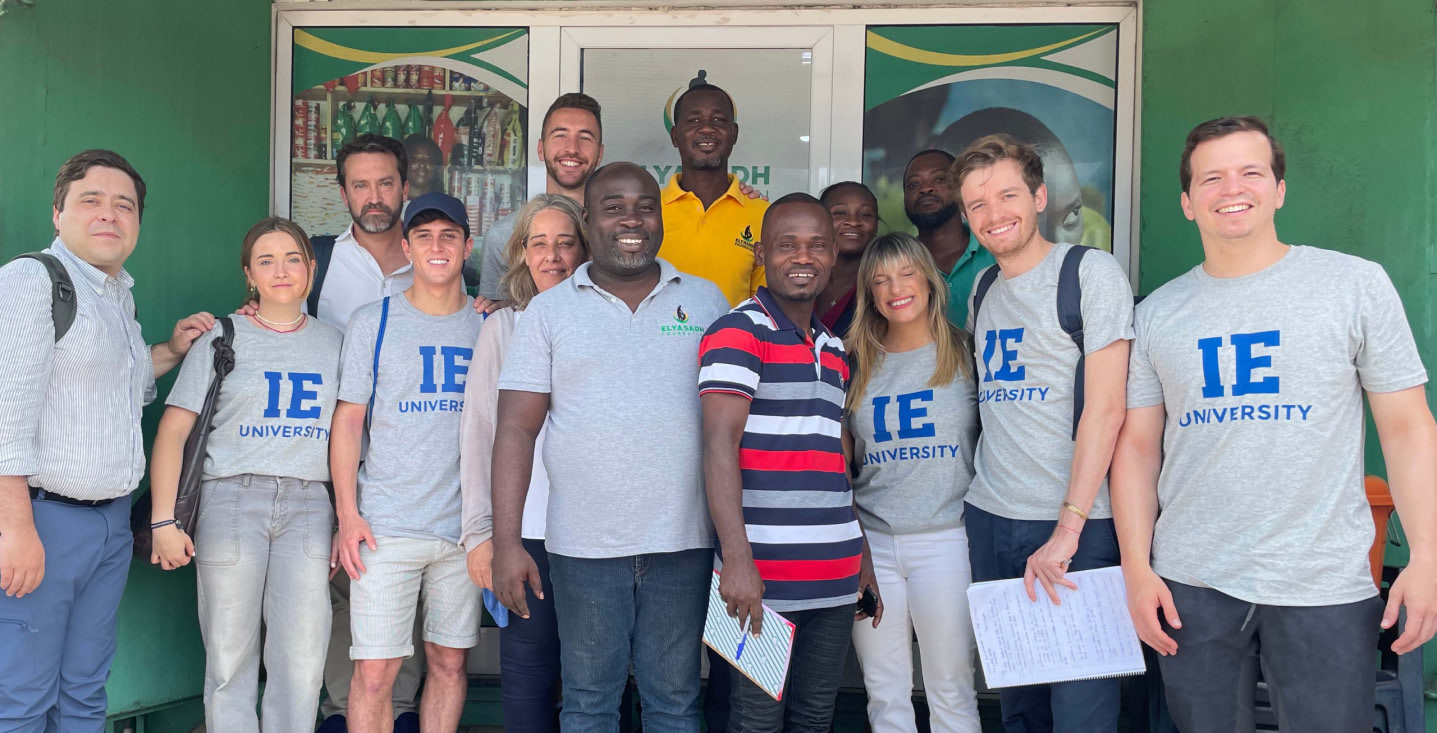15/04/2025
What does succeeding in the workplace mean to you?
According to Alejandra de la Peña, Master in Management Associate Director at IE Talent & Careers, the skills that employees need and the skills that recruiters and companies are looking for have changed. It’s important to focus on identifying your skills and understanding the trends in the sectors that interest you so that you can fill in these skills gaps. This will ultimately lead to success in the workplace.
While companies make hiring decisions based on a candidate’s skill set, the key skill they look for is adaptability. The way we work can change at the drop of a hat and companies want employees who are open to change and can learn on the job. According to Alejandra: “Companies will be looking for a set of skills, but mainly they will be looking for a specific mindset of openness to learn, to adapt.”
Our new reality: The need to adapt at work
Many companies are now operating remotely or in a hybrid manner. Talent strategies now focus on digital, cognitive, adaptability and resilience skills, as well as emotional intelligence and empathy.
These are essential for understanding culture in international business, no matter your surroundings.

What was once a digital tool we had never heard of can easily become a tool we depend on every day—take Microsoft Teams, for example. Your best asset will be your ability to anticipate change.
The possibility of remote work has accelerated our fourth industrial revolution. Fixed working locations are less common, recruitment diversity has rocketed—in terms of expanding talent pools and restructuring hiring processes to reduce bias—and desirable skills have changed. Knowledge surrounding AI engineering, data, cloud computing and product development will soon become the new standard.
What does your “new reality” profile need to look like?
1. Resilience
2. Emotional intelligence
3. Empathy
4. Digital skills
5. Adaptability
Understanding culture in international business: Adapt skill and manner to your surroundings
When you move into the international workplace, you’ll have to overcome cultural barriers and embrace diversity. This influences many facets of international business in both communication and decision-making. We’ll endeavour to make sure you’re ready for the culture in international business by commenting on these factors.
Some cultures value personal connections before discussing business. Others prefer efficiency. When you recognize these differences, you can navigate international negotiations with ease and build stronger connections. There are plenty of examples of cultural differences in international business. You only need to compare the indirectness of business in Japan with the aggressive nature of Wall Street.
Cross-cultural communication skills, including understanding non-verbal cues and cultural subtext, are key for smooth operations.

Investing in local relationships builds trust, which is crucial for success in foreign markets. Adapting HR policies to local norms helps attract top talent, while staying flexible in business practices ensures success. Embracing diversity and local needs leads to stronger relationships and global success.
The new pillars of recruitment: Finding success in the workplace
From students, recruiters are looking for the right mindset, key skills, diversity and specialization. At IE Business School, our academic team constantly adapts our programs to align them with market demands, attracting diversity and using a case study methodology to promote active learning.
Specialist knowledge, however, must come after you’ve got to grips with the big picture. That’s why the Master in Management spends two periods giving you a broad scope of how companies work before you take a deep dive into the specifics.
The Master in Management will allow you to achieve the level of tailored skills that employers are looking for through the management and business fundamentals plus the options to specialize in your area of interest.
How we help you with recruitment
So where does recruitment take place? LinkedIn is a key tool for recruiters to connect with profiles that could be a good fit for specific roles. Another tool that is gaining traction is getting current employees to refer people they know. If who they referred is successful, they often receive a bonus and the company gains someone who is often a better cultural fit and who will stay at the company longer. At IE Business School, we organize virtual fairs and talent forums to introduce you to potential employers and get a sense of the opportunities available to you. Our in-person events also give you the chance to network in a less formal setting and may precede events at companies.
How does recruitment work now?
Recruitment is mainly digital now. It’s quicker, cheaper, enlarges pools, is more flexible and reduces bias.

Online recruitment helps companies use AI technology to narrow down their thousands of applications to the very best candidates.
Stages of the recruitment process:
1. CV or application
It’s especially important to tailor your CV using keywords. These online systems mean not every application gets read by a human, but selection is undertaken by an algorithm, based on keywords. The golden rule of applications is to tailor it to the position, sector and company.
2. Online aptitude tests or games
These games are often run by a company called pymetrics. It’s not always clear what they are assessing, so it’s essential you get in touch with IE Talent & Careers before completing one of these tests to prepare you. With pymetrics, your results are also stored for one year so they’ll be passed on to different applications.
It’s more obvious what aptitude tests are looking for—verbal reasoning, for example.
3. Video interview
Pre-recorded interviews can be difficult, especially considering it’s natural to look at ourselves rather than the camera. That, however, can be a hindrance in video interviews. AI technology assesses you on eye contact, your use of keywords and structure. Remember to smile and vary your pitch and tone, too.
4. 1-1 interview
You’ve reached the first step of the process where you’ll meet a real person. Make your first impression count!
The rest of the process
The rest of the process is straightforward. You’ll likely have an online assessment, which is then followed by offer and finally onboarding sessions.
IE Talent & Careers: What do we do to help you find success in the workplace?
IE Talent & Careers offers impactful career advice and learning resources to help you meet your career goals and tailor your profile to what recruiters are looking for. Everything we do puts you and your future at the center.
Your diverse experience at IE University will instill an ability in you to work in any team, and action learning means you learn by doing.

You’re working hard on your program, why wait to put the skills to work too?
IE Talent & Careers doesn’t stop providing career support to you once you graduate. We provide a life-long service to help you make the most of your IE University experience and finding lasting success in the workplace.
How do we help you?
1. Strategy
We monitor key market trends, focusing on the sectors with greatest growth.
2. Career education
We constantly adapt our careers sessions, communicate trends to you and train you in digital recruiting processes.
3. Advising
We are a specialized team that gets to know your student profile, preferences and potential to empower your advancement.
4. Recruiter relations
We build relationships with recruiters to advise on talent attraction, recommend your profile, and organize careers fairs and company presentations.
5. Technology
We invest in AI and big data to provide relevant resources for you.
Study with us at IE University
At IE University, your master’s program will transform you. You’ll learn from world-class experts and join a diverse community of students, professors, and partners. The experience goes beyond academics, sparking creativity and collaboration that empower you to make a lasting impact.
Our admissions process is straightforward. We’ll guide you every step of the way, helping us understand your strengths. You can attend in-person events, interviews, and campus visits to connect with our vibrant community. Embracing diversity and innovation, we equip you with the skills and mindset to succeed and thrive in a fast-changing world. Follow the link below and start your journey today.

Benjamin is the editor of Uncover IE. His writing is featured in the LAMDA Verse and Prose Anthology Vol. 19, The Primer and Moonflake Press. Benjamin provided translation for “FalseStuff: La Muerte de las Musas”, winner of Best Theatre Show at the Max Awards 2024.
Benjamin was shortlisted for the Bristol Old Vic Open Sessions 2016 and the Alpine Fellowship Writing Prize 2023.








